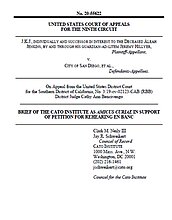Learn more about Cato’s Amicus Briefs Program.
Over the course of a few hours, Aleah Jenkins—in the presence and then in the custody of Officer Lawrence Durbin—suffered a severe medical emergency, causing her to fall into a coma and die. Although she was apparently alert and healthy when first placed in Officer Durbin’s patrol car, she began groaning, breathing irregularly, screaming, and eventually begging for help over the course of an hour-long ride to police headquarters. Despite such obvious signs of medical distress, Officer Durbin did nothing to summon medical care, telling Ms. Jenkins instead to “knock it off.” When they finally arrived, Ms. Jenkins was apparently unconscious and twitching, but Officer Durbin again made no effort to summon medical care, proceeding instead with fingerprinting her. As she slipped in and out of consciousness, Officer Durbin told her to “stop faking,” placed her limp body back in the patrol car, and left her alone for over 11 minutes. Only after returning and discovering that she wasn’t breathing did he finally call for paramedics, who were unable to resuscitate her. She slipped into a coma and died nine days later.
Officer Durbin’s atrocious and inhuman conduct violated Ms. Jenkins’ constitutional rights, and Ms. Jenkins’ son brought a Section 1983 claim on her behalf. But a divided panel of the Ninth Circuit held that Officer Durbin was entitled to qualified immunity, in large part by crediting his patently unreasonable belief that Ms. Jenkins was “faking.” Judge Watford, in dissent, explained in detail how this decision conflicts with longstanding Ninth Circuit case law holding that “[a]n unreasonable mistake of fact does not provide the basis for qualified immunity.” Demuth v. Cnty. of Los Angeles, 798 F.3d 837, 839 (9th Cir. 2015).
Ms. Jenkins’ son therefore filed a petition for rehearing en banc, and Cato filed a brief in support of that petition to elaborate on two major points. First, the panel’s holding that Officer Durbin was entitled to qualified immunity was no mere technical error—it is also reinforces a dangerous but widespread misunderstanding of how the doctrine of qualified immunity should apply in cases of obvious constitutional violations. In its recent decision in Taylor v. Riojas, 141 S. Ct. 52 (2020), the Supreme Court reaffirmed the basic principle that qualified immunity should turn on whether a defendant had “fair warning” that their conduct was unlawful, and that in cases with “particularly egregious facts,” it is unnecessary for plaintiffs to identify a prior case involving the same factual scenario. Id. at 54. Second, persistent misunderstanding of qualified immunity not only gets the law wrong, but its application to police officers exacerbates a growing crisis of accountability in law enforcement. In light of the difficulties posed to public officials by deteriorating public trust, courts should be especially vigilant in identifying and correcting such errors.

This work is licensed under a Creative Commons Attribution-NonCommercial-ShareAlike 4.0 International License.


